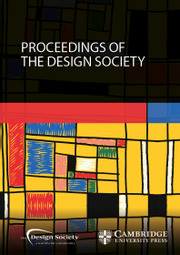Article contents
DESIGNING FOR HUMAN FACTORS: DEVELOPMENT AND EVALUATION OF A HARMONISTIC KNOWLEDGE-BASED DESIGN DECISION SUPPORT TOOL
Published online by Cambridge University Press: 19 June 2023
Abstract
Dual ontological products are a physical construction and an emotional construction. Multitude of human factors must be considering when designing dual ontological products. To increase the product's impact and reach, designers should also understand the requirements of potential users. A design stage conflict exists between the emotional construction and the physical construction of a product when considering human factors. Designers find it difficult to achieve the right compromise between these constructions and hence, the balancing of the two is crucial. This research therefore contributes a novel harmonistic knowledge-based framework which makes designers aware of design stage conflicts and consequences of commitments made on human factors in the use-phase of the artefact. This approach was implemented in a machine learning based computational tool which exploits harmonistic knowledge and information collected from potential users to proactively assist, guide, and motivate product designers. This paper also presents a descriptive study for the evaluation of the framework and its implementation as a computer-based prototype tool. Results show the necessity and beneficial use of the tool for design engineering practice.
Keywords
- Type
- Article
- Information
- Creative Commons
- This is an Open Access article, distributed under the terms of the Creative Commons Attribution-NonCommercial-NoDerivatives licence (http://creativecommons.org/licenses/by-nc-nd/4.0/), which permits non-commercial re-use, distribution, and reproduction in any medium, provided the original work is unaltered and is properly cited. The written permission of Cambridge University Press must be obtained for commercial re-use or in order to create a derivative work.
- Copyright
- The Author(s), 2023. Published by Cambridge University Press
References
- 1
- Cited by


